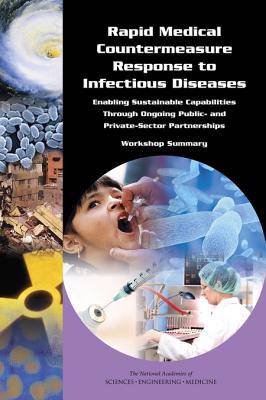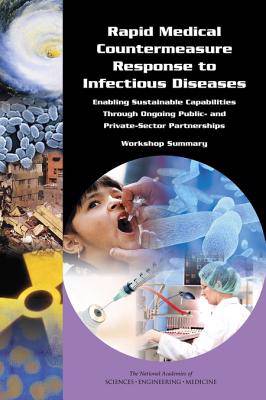
- Retrait gratuit dans votre magasin Club
- 7.000.000 titres dans notre catalogue
- Payer en toute sécurité
- Toujours un magasin près de chez vous
- Retrait gratuit dans votre magasin Club
- 7.000.0000 titres dans notre catalogue
- Payer en toute sécurité
- Toujours un magasin près de chez vous
Rapid Medical Countermeasure Response to Infectious Diseases
Enabling Sustainable Capabilities Through Ongoing Public- And Private-Sector Partnerships: Workshop Summary
National Academies of Sciences Engineering and Medicine, Institute of Medicine, Board on Global Health, Board on Health Sciences Policy, Forum on Microbial Threats, Forum on Drug Discovery Development and Translation, Forum on Medical and Public Health Preparedness for Catastrophic EventsDescription
Emerging infectious disease threats that may not have available treatments or vaccines can directly affect the security of the world's health since these diseases also know no boundaries and will easily cross borders. Sustaining public and private investment in the development of medical countermeasures (MCMs) before an emerging infectious disease becomes a public health emergency in the United States has been extremely challenging. Interest and momentum peak during a crisis and wane between events, and there is little interest in disease threats outside the United States until they impact people stateside.
On March 26 and 27, 2015, the Institute of Medicine convened a workshop in Washington, DC to discuss how to achieve rapid and nimble MCM capability for new and emerging threats. Public- and private-sector stakeholders examined recent efforts to prepare for and respond to outbreaks of Ebola Virus Disease, pandemic influenza, and coronaviruses from policy, budget, and operational standpoints. Participants discussed the need for rapid access to MCM to ensure national security and considered strategies and business models that could enhance stakeholder interest and investment in sustainable response capabilities. This report summarizes the presentations and discussions from this workshop.
Spécifications
Parties prenantes
- Auteur(s) :
- Editeur:
Contenu
- Nombre de pages :
- 176
- Langue:
- Anglais
Caractéristiques
- EAN:
- 9780309378611
- Date de parution :
- 12-03-16
- Format:
- Livre broché
- Format numérique:
- Trade paperback (VS)
- Dimensions :
- 150 mm x 226 mm
- Poids :
- 281 g

Les avis
Nous publions uniquement les avis qui respectent les conditions requises. Consultez nos conditions pour les avis.






